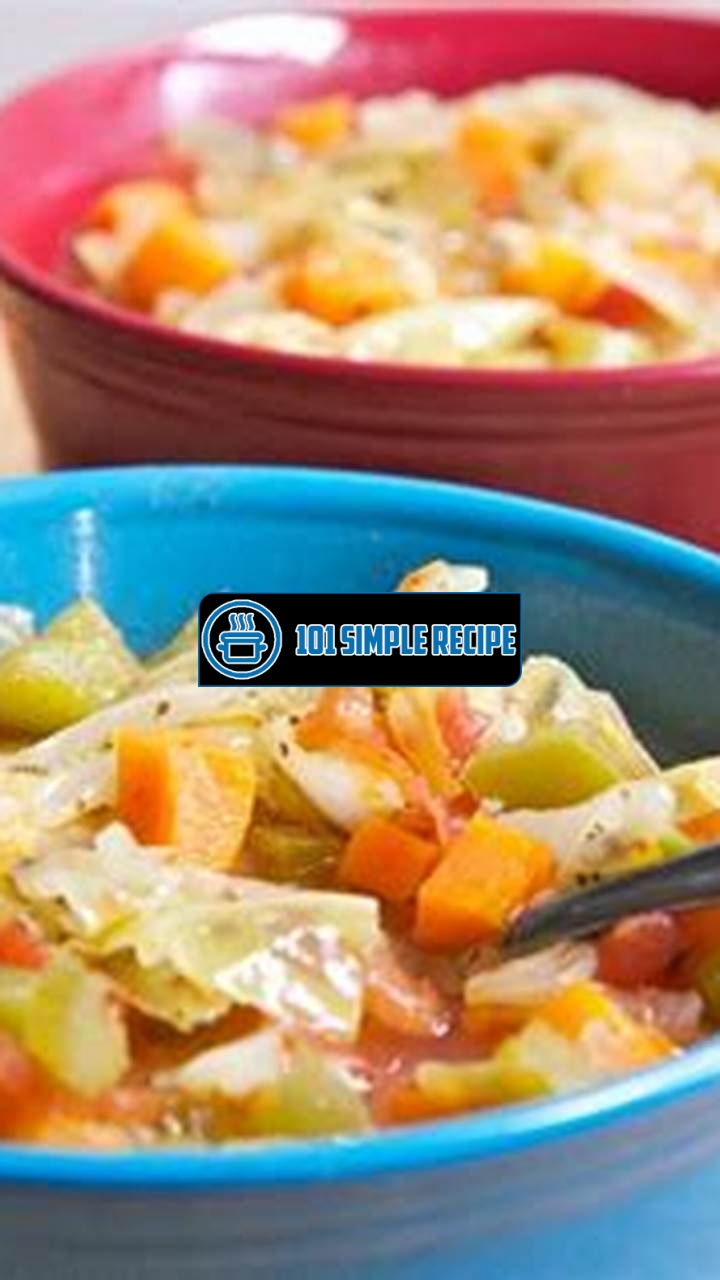If you’re looking to shed some pounds and boost your health, the cabbage soup diet might be just what you need. This low-calorie, high-fiber diet revolves around—you guessed it—cabbage soup! But don’t let that discourage you. With the right ingredients and preparation, this soup can be a flavorful, satisfying, and nutritious addition to your weight loss journey. In this article, we will share our top tips for creating delicious cabbage soup diet recipes that will keep you motivated and satisfied throughout the duration of your diet. So grab your apron and let’s get cooking!

Understanding the Cabbage Soup Diet
Discover the ins and outs of the cabbage soup diet and how it can help jumpstart your weight loss journey.
What is the Cabbage Soup Diet?
The cabbage soup diet is a short-term weight loss program that involves consuming large quantities of cabbage soup for a specific period. As the name suggests, the main component of this diet is cabbage soup, but it also allows for the consumption of certain fruits, vegetables, and other low-calorie foods.
The cabbage soup diet is often used as a quick fix for shedding extra pounds and is popular among people looking to kickstart their weight loss journey. The diet typically lasts for about one week and promises rapid weight loss results.
While it is not a long-term solution for weight management, the cabbage soup diet can help individuals shed a few pounds in a short amount of time. It is often used as a way to jumpstart weight loss or break through a weight loss plateau.
It is important to note that the cabbage soup diet should not be followed for an extended period, as it is low in calories and may not provide all the necessary nutrients for a healthy and balanced diet.
The Benefits of the Cabbage Soup Diet
The cabbage soup diet offers several potential benefits for individuals seeking to lose weight quickly:
- Rapid Weight Loss: The low-calorie nature of the diet can lead to rapid weight loss, making it an attractive option for those with a special event or occasion coming up.
- Increased Vegetable Intake: The diet emphasizes the consumption of cabbage soup and other vegetables, helping individuals increase their daily intake of these nutrient-rich foods.
- Simple and Affordable: The cabbage soup diet does not require any expensive or hard-to-find ingredients, making it a cost-effective option for those on a budget.
- Breaks Weight Loss Plateaus: If you’ve hit a weight loss plateau, the cabbage soup diet may help restart your progress by providing a change in your eating routine.
Potential Risks and Considerations
While the cabbage soup diet can offer short-term benefits, there are several potential risks and considerations to keep in mind:
- Limited Nutrient Variety: The diet is highly restrictive and may not provide all the necessary nutrients that your body needs for optimal health.
- ⏰ Unsustainable Approach: As a short-term diet, the cabbage soup diet is not a sustainable long-term weight loss solution and should not be followed for an extended period.
- ️ Low-Calorie Intake: The diet is very low in calories, which may lead to fatigue, weakness, and difficulty in meeting your daily energy requirements.
- Bland and Monotonous: Consuming large quantities of cabbage soup can become monotonous and may lead to boredom or difficulty sticking to the diet.
It is important to consult with a healthcare professional or registered dietitian before starting any new diet plan, including the cabbage soup diet, to ensure it aligns with your individual nutritional needs and goals.
Preparation and Planning
Preparing and planning are crucial steps for ensuring the success of your cabbage soup diet. By following these tips, you can maximize the effectiveness of the diet and achieve your health and wellness goals.
Choosing the Right Ingredients
When it comes to the cabbage soup diet, selecting the right ingredients is key. Opt for fresh and organic produce whenever possible. This ensures that you’re getting the maximum nutritional value from your ingredients, boosting the overall health benefits of your soup.
- Include a variety of colorful vegetables like carrots, bell peppers, and celery to add flavor and nutrients to your soup. These vegetables are packed with essential vitamins and minerals that can support your overall well-being.
- Don’t forget to include a generous serving of cabbage, the star ingredient of this diet. Cabbage is low in calories and high in fiber, making it an excellent choice for weight loss.
- Consider adding lean proteins like chicken or turkey to your soup. This helps to increase the satiety factor and can keep you feeling fuller for longer.
Remember, the key is to choose ingredients that are nutritious and suit your personal preferences. Experiment with different combinations to find the flavors you enjoy the most.
Meal Prepping and Batch Cooking
Meal prepping and batch cooking are two strategies that can save you time and make sticking to your cabbage soup diet easier.
- Set aside some time each week to plan and prepare your meals in advance. This helps to eliminate the stress of deciding what to eat and reduces the temptation to turn to unhealthy options.
- Prepare a large batch of cabbage soup and portion it into individual containers. This allows you to grab a serving whenever you need it, ensuring that you always have a healthy option on hand.
- Consider incorporating other meals and snacks into your meal prep routine. This way, you have a well-rounded diet that supports your nutritional needs throughout the day.
By embracing meal prepping and batch cooking, you can stay organized and stay on track with your cabbage soup diet, even when life gets busy.
Creating a Balanced Meal Plan
For long-lasting success with the cabbage soup diet, it’s essential to create a balanced meal plan that meets your nutritional needs. Here are some tips to help you do just that:
- Include a variety of food groups to ensure you’re getting a wide range of nutrients. This means incorporating whole grains, lean proteins, fruits, and healthy fats.
- Plan your meals to include a mix of high-fiber foods, proteins, and healthy fats. This combination can help keep you feeling satisfied and prevent cravings.
- Don’t forget to drink plenty of water throughout the day. Staying hydrated is important for overall health and can also aid in weight loss.
Remember, balance is key. Your meal plan should be sustainable and enjoyable, allowing you to stick with the cabbage soup diet long-term. Adapt the plan to suit your taste preferences and dietary restrictions.
By following these preparation and planning tips, you’ll be well-equipped to embark on a successful cabbage soup diet. Remember to consult with a healthcare professional before starting any new diet plan and listen to your body’s needs throughout the process. Good luck!
Making Your Cabbage Soup Delicious
Making your cabbage soup taste delicious is essential when following the cabbage soup diet. By exploring creative ways to add flavor and variety, you can make your soup enjoyable throughout your diet. From incorporating herbs and spices to experimenting with different vegetables, there are several tips to enhance the taste of your cabbage soup.
Herbs and Spices to Enhance Flavor
Adding herbs and spices to your cabbage soup can significantly enhance its flavor. These aromatic ingredients can transform a bland soup into a delightful culinary experience. Here are some herbs and spices you can try:
- Garlic: Adding garlic to your cabbage soup provides a savory and robust flavor. Garlic also offers various health benefits, including boosting the immune system.
- Onion: Incorporating onions into your soup adds a sweet and savory taste. Onions also provide essential nutrients and antioxidants.
- Oregano: This herb adds a pleasant Mediterranean flavor to your cabbage soup. Oregano pairs well with tomatoes and other vegetables, creating a delicious combination of flavors.
- Thyme: Thyme offers a subtle earthy taste and pairs well with cabbage. It adds depth and complexity to your soup.
- Paprika: If you enjoy some heat, paprika can add a spicy and smoky flavor to your cabbage soup. It pairs well with other spices and provides a vibrant color to your dish.
Incorporating Protein-Rich Additions
While the cabbage soup diet primarily focuses on vegetables, incorporating protein-rich additions can make your soup more satisfying and balanced. Protein is essential for repairing tissues, building muscles, and regulating hormones. Here are some protein-rich additions you can consider:
- Chicken: Adding cooked chicken to your cabbage soup adds a hearty and protein-packed element. It also provides a savory flavor and can make your soup more filling.
- Beans: Incorporating beans, such as kidney beans or chickpeas, adds both protein and fiber to your soup. Beans provide a creamy texture and give your soup a more substantial consistency.
- Tofu: If you prefer a vegetarian or vegan option, tofu can be an excellent source of protein to include in your cabbage soup. It absorbs the flavors of the other ingredients and adds a delicate and silky texture.
- Quinoa: Quinoa is a complete protein and a nutritious addition to your cabbage soup. It adds a subtle nutty flavor and a slight crunch.
Experimenting with Different Vegetables
One of the advantages of the cabbage soup diet is its versatility in terms of vegetable options. You can experiment with different vegetables to add variety and more nutritional value to your soup. Here are some suggestions:
- Carrots: Carrots add a touch of sweetness and vibrant color to your cabbage soup. They are also rich in beta-carotene and vitamin A.
- Spinach: Adding spinach boosts the nutritional profile of your soup. It is packed with vitamins, minerals, and antioxidants.
- Zucchini: Zucchini’s mild flavor and tender texture make it a great addition to cabbage soup. It also provides vitamins, minerals, and dietary fiber.
- Bell Peppers: Incorporating bell peppers adds a refreshing crunch and a hint of sweetness to your soup. They are also an excellent source of vitamin C.
- Cauliflower: Cauliflower florets can add a unique texture and mellow flavor to your cabbage soup. This vegetable is also packed with vitamins and minerals.
By exploring these tips for making your cabbage soup delicious, you can enjoy a flavorful and satisfying meal while following the cabbage soup diet. Don’t be afraid to experiment with different flavors and ingredients to find the combination that suits your taste buds!
Tips for Sticking to the Cabbage Soup Diet
Discover effective strategies to stay motivated and committed to the cabbage soup diet for optimal results.
Setting Realistic Expectations
When embarking on the cabbage soup diet, it is crucial to set realistic expectations for yourself. It’s important to remember that this diet is not a quick fix or a magic solution. It requires dedication and commitment to see results.
First and foremost, you must understand that the cabbage soup diet is a short-term plan aimed at jumpstarting weight loss. It is not intended for long-term use. Setting realistic goals for your desired weight loss during the diet is essential. ⚖️
Keep in mind that the cabbage soup diet is primarily a low-calorie eating plan. While it can lead to rapid weight loss, it is crucial to understand that much of the initial weight loss is water weight. This is not the same as losing fat. So, be prepared for a potential slowdown in weight loss after the initial phase.
Finding Support and Accountability
Embarking on any diet can be challenging, and the cabbage soup diet is no exception. One effective strategy for staying motivated and committed is to find support and accountability.
Consider joining a support group or finding a diet buddy who is also following the cabbage soup diet. Having someone to share your experience with can provide valuable encouragement and motivation.
Additionally, utilizing online forums and social media groups can also provide a sense of community and support. It’s important to surround yourself with like-minded individuals who can share tips, recipes, and success stories.
Dealing with Cravings and Hunger
Cravings and hunger pangs are common challenges when following any diet, including the cabbage soup diet. However, there are strategies you can employ to manage these obstacles effectively. ♂️
One tactic is to ensure you are properly hydrated throughout the day. Sometimes, feelings of hunger can be mistaken for thirst. Drinking an adequate amount of water can help curb hunger and prevent overeating.
Including high-fiber foods in your meals can also help you feel satisfied for longer periods. Foods like fruits, vegetables, and whole grains provide bulk and keep you feeling full. They can also help regulate blood sugar levels and prevent energy crashes.
If cravings become overwhelming, allow yourself occasional indulgences in moderation. Completely depriving yourself of your favorite foods can lead to binge eating or feelings of deprivation. Treat yourself to a small portion of your favorite treat once in a while as a reward for sticking to the cabbage soup diet.
In conclusion, following the cabbage soup diet requires setting realistic expectations, finding support and accountability, and effectively managing cravings and hunger. By implementing these tips, you can stay motivated and committed to your weight-loss goals. Remember, the cabbage soup diet is a short-term plan, and it’s always essential to consult with a healthcare professional before making any drastic changes to your diet.
Transitioning Off the Cabbage Soup Diet
Once you have successfully completed the cabbage soup diet and achieved your desired weight loss, it is important to transition off the diet in a safe and sustainable manner. This will help you maintain your weight loss momentum and prevent any potential rebound effects. Here are some top tips for transitioning off the cabbage soup diet:
Gradual Reintroduction of Solid Foods
As you conclude the cabbage soup diet, it is crucial to gradually reintroduce solid foods into your daily meals. This will allow your body to adjust to a wider range of nutrients and prevent any digestive issues. Start by incorporating small portions of vegetables, lean proteins, and whole grains into your diet. This gradual approach will help your body readjust and ensure a smooth transitioning process.
Remember: Slowly reintroducing solid foods will help maintain your weight loss and prevent any sudden weight gain.
Establishing a Sustainable Eating Plan
Creating a sustainable eating plan after the cabbage soup diet is essential for long-term weight management. This means finding a balanced approach that includes a variety of nutrient-rich foods. Aim to include fruits, vegetables, lean proteins, whole grains, and healthy fats in your daily meals. It is also important to keep portion sizes in check and listen to your body’s hunger and fullness cues.
Pro Tip: Focus on incorporating whole, unprocessed foods into your diet to maximize nutritional value and support a healthy lifestyle.
Continuing Healthy Lifestyle Habits
Maintaining a healthy lifestyle is crucial even after you transition off the cabbage soup diet. Along with a balanced eating plan, it is important to continue regular physical activity and ensure adequate hydration. Engaging in regular exercise not only helps with weight management but also promotes overall well-being. Additionally, make sure to prioritize sufficient sleep and manage stress levels to support your weight loss journey.
Takeaway: By incorporating regular exercise, staying hydrated, and prioritizing self-care, you can sustain your weight loss and live a healthier life.
Transitioning off the cabbage soup diet requires a mindful approach to ensure long-term success. By gradually reintroducing solid foods, establishing a sustainable eating plan, and continuing healthy lifestyle habits, you can maintain your weight loss momentum and achieve your health goals. Remember to listen to your body, make conscious food choices, and prioritize self-care throughout your journey.
Thank you for taking the time to read our article on cabbage soup diet recipes tips. We hope that you found the information helpful and inspiring for your own journey towards a healthier lifestyle. If you enjoyed this article, be sure to bookmark our website and visit again later for more delicious recipes and useful tips. Remember to always make small changes to your diet and consult with a healthcare professional before starting any new diet plan. With dedication and determination, you can achieve your health goals. Cheers to a healthier you!
Frequently Asked Questions
Here are some frequently asked questions about cabbage soup diet recipes:
| No. | Questions | Answers |
|---|---|---|
| 1 | What is the cabbage soup diet? | The cabbage soup diet is a short-term weight loss diet that involves consuming mainly cabbage soup along with a few other low-calorie foods. It is designed to help individuals shed pounds quickly. |
| 2 | Are there any risks associated with the cabbage soup diet? | While the cabbage soup diet can lead to rapid weight loss, it is not suitable for long-term use and may not provide all the necessary nutrients. It is important to consult with a healthcare professional before starting any new diet plan. |
| 3 | Can I customize cabbage soup recipes? | Absolutely! The beauty of cabbage soup recipes is that they can be easily customized to suit your preferences. Feel free to experiment with different vegetables, herbs, and spices to create your own unique flavors. |
| 4 | Is the cabbage soup diet suitable for vegetarians or vegans? | Yes, the cabbage soup diet can be adapted to be vegetarian or vegan-friendly. Simply omit any animal-derived ingredients and use vegetable broth instead of chicken broth. |
| 5 | Can I exercise while on the cabbage soup diet? | While light exercises like walking or yoga can be beneficial, it is important to listen to your body and not overexert yourself. The cabbage soup diet is a low-calorie diet, so it’s advisable to consult with a healthcare professional before engaging in intense workouts. |
| 6 | How long can I follow the cabbage soup diet? | The cabbage soup diet is not intended to be followed for more than seven days at a time. It is meant to kickstart weight loss and should be followed by a balanced, nutritious diet for long-term results. |
Cabbage Soup Diet Recipe
Here is a delicious and healthy cabbage soup recipe for you to enjoy:
Jump to Recipe
Cabbage Soup Diet Recipe

A nutritious and flavorful cabbage soup recipe that is perfect for the cabbage soup diet.
- 1 small head of cabbage (chopped)
- 1 onion (diced)
- 2 carrots (sliced)
- 2 celery stalks (chopped)
- 4 cups vegetable broth
- 1 can diced tomatoes
- 2 cloves garlic (minced)
- 1 teaspoon dried thyme
- 1 teaspoon paprika
- Salt and pepper to taste
- In a large pot, heat some olive oil over medium heat. Add the onion, carrots, and celery, and cook until they begin to soften.
- Stir in the garlic, thyme, paprika, salt, and pepper. Cook for an additional minute.
- Add the cabbage, vegetable broth, and diced tomatoes. Bring to a boil, then reduce heat and let simmer for about 20-25 minutes, or until the vegetables are tender.
- Serve hot and enjoy!






